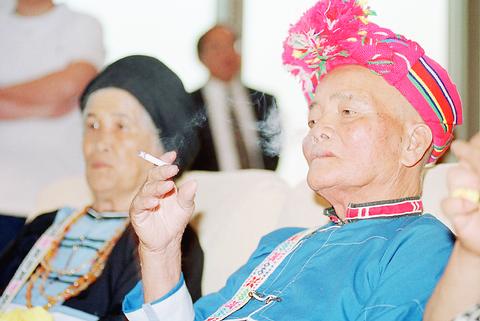Difang (
"My father had been suffering from diabetes in recent years," Difang's son, Chiang Chin-hsing (
Difang, of Taiwan's Amis tribe, gained global recognition for his wide vocal range and his memorable tune, A Drinking Song for the Elders, after the German music group Enigma sampled it for use in its hit track Return to Innocence. The song made such an impression that it eventually was used as the theme song for the 1996 Olympic Games in Atlanta and was included in its commemorative CD.

PHOTO: CHEN CHENG-CHANG, TAIPEI TIMES
However, Diafang was far from impressed to learn that Enigma was making serious money from his original song, which was used without obtaining his prior consent.
"On behalf of Difang, we, the Magic Stone Music Co, took [Enigma's] recording company to court the same year [1996] for violating intellectual property rights," said Magic Stone's spokeswoman Elai-ne Hsiung (熊儒賢), who had worked with Difang on the production of his albums.
According to Hsiung, the lawsuit was resolved in Difang's favor in 1999, after the parties settled out of court. In the settlement, Enigma's recording company agreed to compensate Difang financially.
"Winning was very meaningful to Difang," Hisung said, "because it realized Difang's wish, which was to make known to the whole world that the voice behind the enchanting 1996 Atlantic Games' theme song was that of a member of Taiwan's Amis tribe."
"Difang's voice was indeed a voice of innocence," Hsiung said. "A voice that is an almost unworldly combination of pride and free-spiritedness and an outpouring of truth and beauty that touches peoples' hearts."
"Difang was considered a national treasure for his great contribution to Taiwan," said independent legislator May Chin (
"Not just because he introduced Taiwan's Aboriginal music to the world stage through his exceptional voice," Chin said, "but also because he was wholeheartedly behind the promotion of Taiwan's Aboriginal cultures."
Hsiung echoed Chin's remarks.
"Out of a sense of mission and cultural expectation," Hsiung said, "Difang made numerous world tours to countries like France and Japan and enjoyed giving public performances."
Difang released two solo albums named Circle of Life and Across The Yellow Earth in 1998 and last year respectively. He was also involved in the production of several other Aboriginal recordings.
"Without doubt, it is fair to say that Difang was a pioneer of Taiwan's Aboriginal music," Hsiung said. "It was because of him that Aboriginal youngsters such as Wang Hung-en (王宏恩) and Chen Chien-nien (陳建年) gained the courage to begin singing careers."
"Difang's death is a great loss to Taiwan's Aborigines and to Taiwan's cultural reservoir," Chin said. "We'll never again hear a voice quite as haunting as his again."

A magnitude 5.6 earthquake struck off the coast of Yilan County at 12:37pm today, with clear shaking felt across much of northern Taiwan. There were no immediate reports of damage. The epicenter of the quake was 16.9km east-southeast of Yilan County Hall offshore at a depth of 66.8km, Central Weather Administration (CWA) data showed. The maximum intensity registered at a 4 in Yilan County’s Nanao Township (南澳) on Taiwan’s seven-tier scale. Other parts of Yilan, as well as certain areas of Hualien County, Taipei, New Taipei City, Taoyuan, Hsinchu County, Taichung and Miaoli County, recorded intensities of 3. Residents of Yilan County and Taipei received

Taiwan has secured another breakthrough in fruit exports, with jujubes, dragon fruit and lychees approved for shipment to the EU, the Ministry of Agriculture said yesterday. The Animal and Plant Health Inspection Agency on Thursday received formal notification of the approval from the EU, the ministry said, adding that the decision was expected to expand Taiwanese fruit producers’ access to high-end European markets. Taiwan exported 126 tonnes of lychees last year, valued at US$1.48 million, with Japan accounting for 102 tonnes. Other export destinations included New Zealand, Hong Kong, the US and Australia, ministry data showed. Jujube exports totaled 103 tonnes, valued at

TRUST: The KMT said it respected the US’ timing and considerations, and hoped it would continue to honor its commitments to helping Taiwan bolster its defenses and deterrence US President Donald Trump is delaying a multibillion-dollar arms sale to Taiwan to ensure his visit to Beijing is successful, a New York Times report said. The weapons sales package has stalled in the US Department of State, the report said, citing US officials it did not identify. The White House has told agencies not to push forward ahead of Trump’s meeting with Chinese President Xi Jinping (習近平), it said. The two last month held a phone call to discuss trade and geopolitical flashpoints ahead of the summit. Xi raised the Taiwan issue and urged the US to handle arms sales to

BIG SPENDERS: Foreign investors bought the most Taiwan equities since 2005, signaling confidence that an AI boom would continue to benefit chipmakers Taiwan Semiconductor Manufacturing Co’s (TSMC, 台積電) market capitalization swelled to US$2 trillion for the first time following a 4.25 percent rally in its American depositary receipts (ADR) overnight, putting the world’s biggest contract chipmaker sixth on the list of the world’s biggest companies by market capitalization, just behind Amazon.com Inc. The site CompaniesMarketcap.com ranked TSMC ahead of Saudi Aramco and Meta Platforms Inc. The Taiwanese company’s ADRs on Tuesday surged to US$385.75 on the New York Stock Exchange, as strong demand for artificial intelligence (AI) applications led to chip supply constraints and boost revenue growth to record-breaking levels. Each TSMC ADR represents